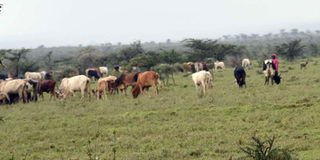Try technology to fix pastoralists’ woes

Herders graze their cows illegally at a farm in Rumuruti, Laikipia County, on November 9, 2017. PHOTO | EVANS HABIL | NATION MEDIA GROUP
What you need to know:
- It’s common knowledge that traditional pastoralism as practised in the region increases environmental stress.
- Leaders should form a permanent technical committee to develop an integrated socio-economic programme.
Innovation can help end the frequent conflicts that have afflicted Laikipia, Baringo, Samburu and Isiolo counties for so long, and finally help turn around the region economically.
Migratory pastoralism, which is a deeply rooted culture, is mainly the cause of these conflicts that slow down social development and economic integration and therefore expose residents to frequent starvation and poverty.
A coalescence of newly elected leaders from the region dubbed the ‘Amaya' could give a ray of hope to a region scarred by sporadic conflicts and redeem it from economic abyss, if it lives to its spirit.
LIVESTOCK
Innovation and push for alternative economic activities away from the traditional nomadic pastoralism as envisaged by this initiative that triggers conflicts can end the conflicts.
For instance, some prominent and really powerful people are known to be the owners of hundreds of animals that are often driven to Laikipia from Samburu, Isiolo and Baringo counties.
Why such elites would continue herding their cattle the same way their great grandfathers used to do centuries ago despite technological advancement, should be the big question.
DEVELOPMENT
While many of the region’s communities have a cultural attachment to cattle, embracing such technology as the use of feedlots would achieve the same objectives and even yield more.
Improvement of the entire livestock value chain, establishing livestock disease- free zones, feedlots and development of infrastructure such as water pans, boreholes, rural access roads as well as construction of police posts can give the region a comparative advantage in beef production and even help the country reclaim its beef export quota to the European Union.
Add irrigation and horticulture to the list and the region would be on a par with the rest of the country, if not ahead, in terms of development.
RULE OF LAW
The leaders need a common agenda, specifically to catalyse development in the region.
Their unity of purpose can enable them pursue shared prosperity, inclusivity in diversity and promote conservation of unique and common ecological system and cultures.
Instead of retreating into their tribal cocoons, these leaders should find a common voice in advocating strict adherence to the rule of law and national values as well as committing financial resources to development of institutions of learning that address challenges that are unique to the region.
CONSULTATION
It’s common knowledge that traditional pastoralism as practised in the region increases environmental stress.
Leaders with a foresight should guide their people to be in tandem dynamics of the world instead of helping them to cling to the impoverished past.
Luckily, a majority of these new political leaders have the required goodwill, if the consultative meetings are anything to go by.
This is an indication of a shared desire for economic prosperity of the region.
SOLUTION
The inclusion of such institutions as the Commission on Revenue Allocation and the Kerio Valley Development Authority shows a paradigm shift by the leaders to adopt a common approach that would pressurise the national government to commit extra resources to address the region’s peculiar challenges.
Moving forward, they should form a permanent technical committee to develop an integrated socio-economic programme and to coordinate peace and security together with the national government.
This way, the sporadic conflicts experienced for years in the region would be a thing of the past.
Mr Gitonga is a communications official at the Laikipia Governor’s Office. [email protected]




